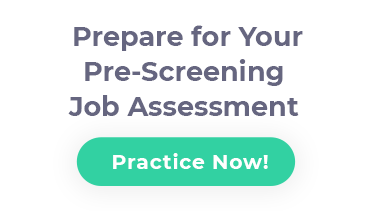Telus Assessment Tests, Recruitment Process & Interviews Online Preparation with Free Practice Questions [2025]

What Is Telus?
Telus is a technology company designing the next generation of digitally-led customer experiences. They provide their customers with end-to-end service innovation tailored to their specific needs, including the product’s design, build, and delivery.
Telus has clients in several industries, including:
Telus was founded in 2005 and is currently headquartered in Vancouver, Canada. The company operates in 28 countries worldwide and has over 70,000 team members.
Working at Telus
Telus is focused on creating human-centered designs, so it is not surprising that the company values employee engagement and growth. Telus has a Culture Value Chain formula that they implement for their employees to generate results and create a great work environment.
- Corporate Culture: These values and behaviors define interactions between coworkers and customers.
- Team Engagement: Telus’ culture is to surround employees with things that matter to them to engage them personally and professionally.
- Long Tenure: The company knows that employees will stay when they are connected to the work they do and the people they work with.
- Design Thinking & CX Innovation: Employees who have been at the company and are engaged in their work will take ownership of their work and be capable of the design thinking required for innovation.
- Improved Customer Experience: Creative team members empowered by their job will get better customer results and outcomes.
- Business Growth: When all factors of the equation are aligned, the company will experience sustained top-line growth.
In addition to the typical employee benefits, Telus provides learning and development opportunities, creative and inspiring workspaces, and health and wellness benefits. The company also encourages its employees to give back to their communities and provides numerous volunteer opportunities.
What Is Telus’ Hiring Process?
Online Application
To begin the recruitment process at Telus, you must first submit an online application. You can use the Telus website to search for open positions and find one that suits your career goals and skill set. Then you will enter your basic information such as name, contact details, educational history, and past work experience.
You will also submit a resume with detailed information. Be sure to tailor this document to the position and include keywords from the job description so your application stands out. You will also want to list any skills or certifications relevant to the desired position.
Once submitted, a member of human resources will review your application, and if they feel you would be a good fit for the position, you will graduate to the next stage of the process: online assessments.
Telus English Test
Telus uses the SHL verbal reasoning test for its applicants. The exam will present several short passages you must read and answer questions about. You will need to determine whether given statements are true, false, or indeterminable based on the selection you have just read.
The passages are likely related to the position you are applying for; however, it is essential not to use any outside knowledge while taking the exam. Only use the information provided in the passage when answering the questions.
Reading and understanding written information is vital for all positions, so candidates must do well.
Numerical Reasoning Test
Candidates can also expect to take a SHL numerical reasoning test. This will assess your ability to read and interpret data and perform basic mathematical calculations. You will receive data from a chart, table, or graph and have to answer multiple-choice questions based on the information.
You should be prepared to use fractions, ratios, percentages, and conversation when solving the problems on this exam.
Spatial Reasoning Test
Depending on the role you are applying for, some candidates may also take a spatial reasoning exam. This will test your ability to visualize objects and images from different vantage points. For example, you may see a 3D object and have to imagine how it would look from a different angle.
Predictive Index Learning Indicator
You may also encounter a Predictive Index Learning Indicator (PI LI) test, previously known as the PLI test, during recruitment. This test will also cover verbal, numerical, and non-verbal reasoning. This exam will consist of 50 questions, and you will only have 12 minutes to complete it, so you must work quickly and efficiently through this exam.
Predictive Index Behavioral Assessment
Lastly, candidates must take the Predictive Index (PI) Behavioral Assessment. This exam will give the employer an idea of how you perform in the workplace. The test will assess four primary personality characteristics:
- Extroversion
- Dominance
- Patience
- Formality
This test is untimed, and there are no right or wrong answers to the exam. However, you will want to keep Telus’ values and what they are looking for in a candidate in mind when taking the test.
Initial Interview
Those who do well on the various assessments will be invited to interview with a member of human resources. This initial interview will last about 45 minutes and will focus on your qualifications and ability to perform the tasks required for the role.
Be ready to go into more detail about anything you put on your application, as the interviewer will want you to draw from concrete examples to answer their questions.
Assessment Centre
Candidates who do well on the initial interview will be able to attend the assessment centre day. This event will take several hours and require you to complete several exercises on your own and with other candidates. Here are a few of the activities you may partake in:
- Case Study: You will receive a document you must read and analyze. You will then have to decide what action should be made in the scenario and defend your response.
- Group Exercise: You will work with other candidates to solve a workplace issue.
- Presentation: You will give a presentation either on the case study you read earlier or on another topic given to you ahead of time. You will then answer questions from the hiring team about the subject.
- Role-Plays: You will work with a hiring team member in a simulated situation. For example, the other person may pretend to be a customer with a problem you will need to solve.
Final Interview
All candidates will also complete a final face-to-face interview at the assessment centre. These questions will be behavior and competency-based since they already believe you are qualified for the position.
During this conversation, be sure to draw from concrete examples from your previous experience and format your response according to the STAR method:
- Describe the Situation.
- Discuss the Tasks you needed to accomplish.
- Inform the interviewer of the Actions you took.
- Recount the Results that came from your efforts.
Telus Interview Questions Examples:
- How familiar are you with Telus’ products and services, and how do you see yourself contributing to the company’s success?
- Telus operates in a highly competitive industry, how do you prioritize and manage your work in a fast-paced environment?
- How do you approach learning new technologies and skills, and how would you apply these skills at Telus?
- Can you provide an example of a technical project you have worked on that aligns with Telus’ business objectives and values?
- Can you describe a technical concept or solution you have developed that was particularly innovative or unique?
Telus Assessment Sample Questions
- A factory produces two types of widgets, A and B. For every 3 widgets of type A, the factory produces 5 widgets of type B. If the factory produces a total of 240 widgets in one shift, how many of them are type A?
- 72
- 90
- 96
- 144
- You are reviewing a report with 100 pages. On each page, there are 60 lines. You find an error rate of 3% per line. How many errors should you expect to find in the entire report?
- 180
- 200
- 150
- 120
- A shipment of 500 parts contains 2% defective items. After inspecting 50 parts, none were defective. What is the maximum number of defective parts that could still remain in the uninspected portion?
- 10
- 9
- 8
- 7
- Consider the following sequence: 2, 6, 12, 20, 30, __. What number comes next in the sequence?
- 38
- 42
- 46
- 52
- You are analyzing the number of units sold over 5 months: 250, 275, 300, 335, 370. Assuming the pattern continues, what is the expected number of units sold in the next month?
- 410
- 420
- 405
- 415
Answers:
- A
- B
Explanation: 2% of 500 is 10 defective parts. Since none were found in the inspected 50 parts, the remaining 450 parts could still contain 9 defective items.
- C
- D
Explanation: The differences between consecutive sales are: 275-250=25, 300-275=25, 335-300=35, 370-335=35. The next increase should be 45, so 370+45=415.
- B
Explanation: The ratio of A to B is 3:5, meaning 3/8 of the total production is A. So, 3/8×240=90.
How to Prepare for the Telus Assessments?
Like all exams, those who prepare for the Telus assessments will receive the highest score. Because the company uses these exams to compare candidates and determine who is best suited for the position, you must give yourself adequate time to study and prepare.
Online study resources such as practice tests and study guides are great to use when preparing for pre-employment assessments. These will give you a better idea of what to expect on the exam and provide tips on approaching questions. They will also give advice and tips on how to do well on the various exams.

